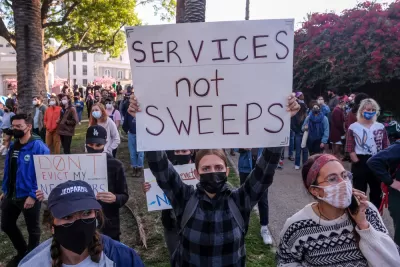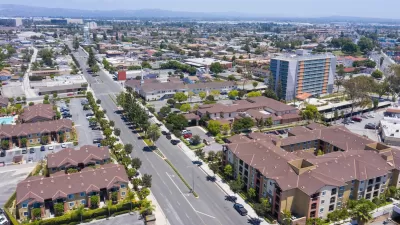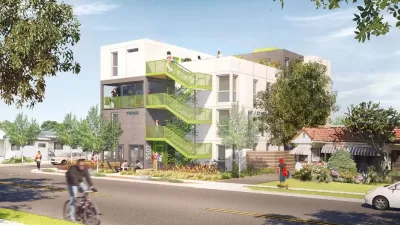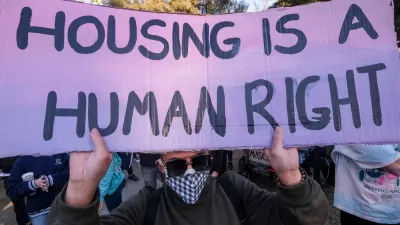Advocates say L.A.'s new focus on clearing 'unsightly' homeless encampments is a political band-aid that won't help people find permanent housing.

Benjamin Oreskes and Doug Smith report on a new policy in the city of Los Angeles aimed at clearing homeless encampments that critics say is an inhumane and politically motivated solution to a much bigger problem.
The approved motions authorize the city to post signs notifying people camped in the designated locations that they have 14 days to leave. Outreach workers will offer shelter beds to everyone affected to keep the city in compliance with a federal court ruling that prohibits the ticketing or arrest of anyone for camping in a public space when no shelter is available.
So far, City Council members have suggested close to 300 locations to designate as off-limits to camping. According to the article, Mayor Eric Garcetti called the policy a balance between the needs of unhoused people and pressures from neighborhood groups. Advocates for the unhoused say that "the change in policy elevates politics over need, creating a squeaky-wheel strategy of clearing those street encampments that have become the biggest liabilities to members of the City Council."
Over 40,000 people experience homelessness in Los Angeles each year, with that number far outpacing the supply of shelter beds or transitional housing. Earlier this year, Councilmember Mitch O'Farrell received widespread criticism during what many perceived as an aggressive clearing of an encampment in Echo Park. While the council has voted to fund more outreach and supportive housing programs, some activists argue that temporary housing solutions like the tiny home villages built this year don't go far enough to provide long-term solutions for unhoused people, who often fall back into homelessness after relocating to transitional housing.
FULL STORY: L.A. just changed its entire approach to homelessness. Does it place politics above need?

Planetizen Federal Action Tracker
A weekly monitor of how Trump’s orders and actions are impacting planners and planning in America.

DARTSpace Platform Streamlines Dallas TOD Application Process
The Dallas transit agency hopes a shorter permitting timeline will boost transit-oriented development around rail stations.

Congressman Proposes Bill to Rename DC Metro “Trump Train”
The Make Autorail Great Again Act would withhold federal funding to the system until the Washington Metropolitan Area Transit Authority (WMATA), rebrands as the Washington Metropolitan Authority for Greater Access (WMAGA).

Supreme Court Ruling in Pipeline Case Guts Federal Environmental Law
The decision limits the scope of a federal law that mandates extensive environmental impact reviews of energy, infrastructure, and transportation projects.

Texas State Bills to Defund Dallas Transit Die
DART would have seen a 30% service cut, $230M annual losses had the bills survived.

Bikeshare for the Win: Team Pedals to London Cricket Match, Beats Rivals Stuck in Traffic
While their opponents sat in gridlock, England's national cricket team hopped Lime bikes, riding to a 3-0 victory.
Urban Design for Planners 1: Software Tools
This six-course series explores essential urban design concepts using open source software and equips planners with the tools they need to participate fully in the urban design process.
Planning for Universal Design
Learn the tools for implementing Universal Design in planning regulations.
Roanoke Valley-Alleghany Regional Commission
City of Mt Shasta
City of Camden Redevelopment Agency
City of Astoria
Transportation Research & Education Center (TREC) at Portland State University
US High Speed Rail Association
City of Camden Redevelopment Agency
Municipality of Princeton (NJ)





























